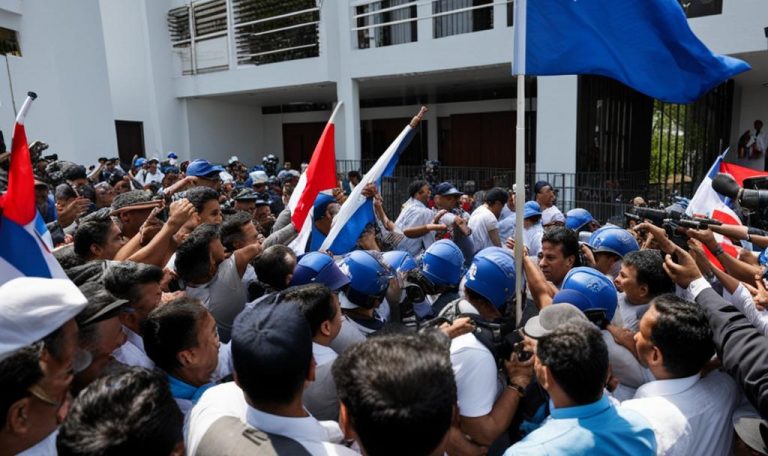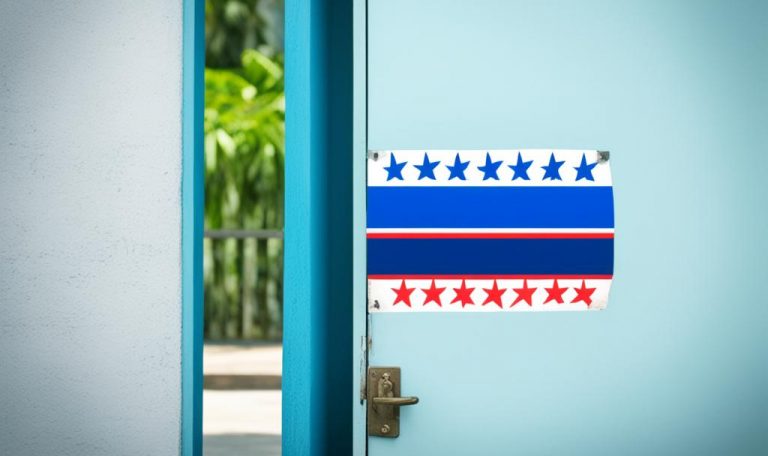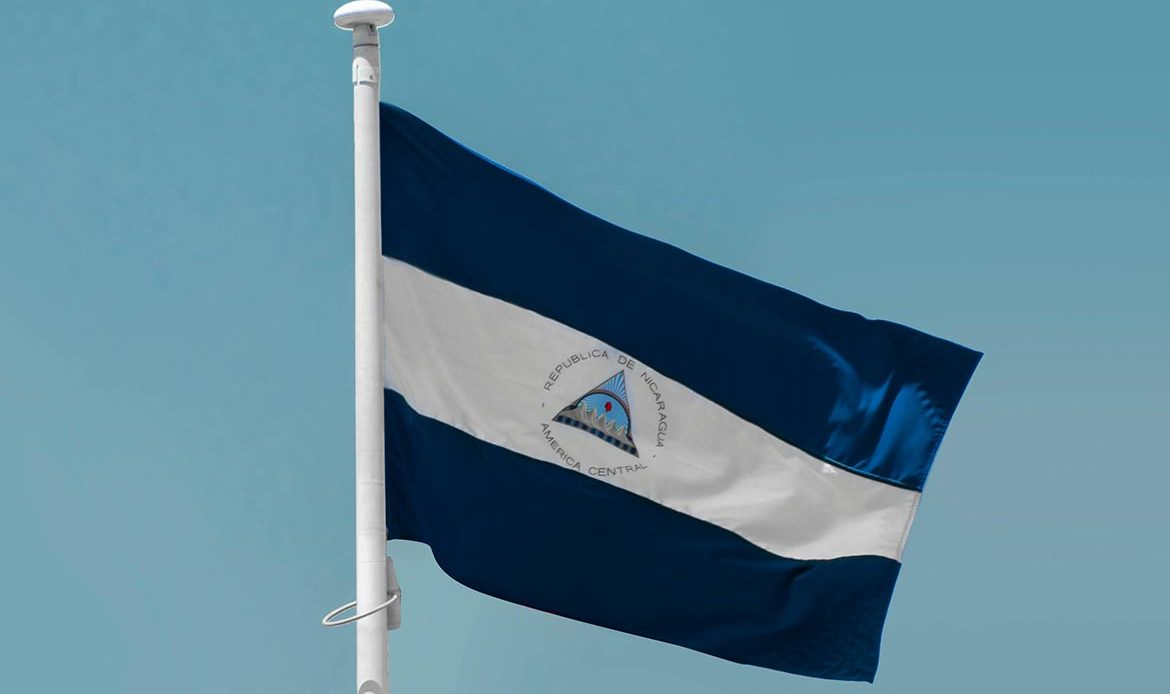Panama has recently made the decision to deny Nicaragua’s request to establish a consulate in the house next to the Nicaraguan embassy in Panama City. This decision comes amid a diplomatic dispute over the extradition case of former President Ricardo Martinelli, who is currently seeking asylum at the Nicaraguan embassy to avoid a prison sentence for charges of money laundering.
The denial of Nicaragua’s request further intensifies the ongoing embassy dispute between Panama and Nicaragua. Panama’s Foreign Ministry has also expressed its refusal to recognize diplomatic privileges and immunities in the adjacent property, signaling its stance on the issue.
Since taking refuge at the Nicaraguan embassy on February 2, Martinelli has been using social media platforms to issue political statements, despite warnings from the Panamanian government about potential diplomatic consequences. Panama has accused Nicaraguan President Daniel Ortega of violating diplomatic agreements by allowing Martinelli’s activities within the embassy.
In response to Martinelli’s actions, Panama has lodged a formal protest note with Nicaragua, criticizing their permissive attitude and demanding measures be taken to prevent further political activities at the embassy. These tensions between the two countries have been escalating as the diplomatic conflict surrounding the Martinelli case continues.
Martinelli, who was convicted of money laundering and sentenced to 128 months in prison and a fine of $19 million, has been able to evade serving his sentence due to his asylum in the embassy. His conviction was based on using public funds to acquire the majority of shares in Editora Panamá América, utilizing a complex scheme of bribes amounting to $43.9 million.
The ongoing dispute between Panama and Nicaragua regarding the sheltering of former President Martinelli in the embassy persists, straining diplomatic relations between the two nations. The implications of this controversy on Martinelli’s extradition case and the overall relationship between Panama and Nicaragua remains to be seen.
Key Takeaways:
- Panama has rejected Nicaragua’s request to establish a consulate in the house adjacent to the Nicaraguan embassy in Panama City.
- The denial highlights the ongoing embassy dispute between Panama and Nicaragua.
- Panama does not recognize diplomatic privileges and immunities in the adjacent property.
- Former President Martinelli sought asylum at the Nicaraguan embassy to avoid a prison sentence for money laundering charges.
- Panama has protested against Nicaragua’s permissive attitude and demands measures to prevent further political activities at the embassy.
Panama’s Refusal to Recognize Diplomatic Privileges and Immunities
In the ongoing diplomatic conflict between Panama and Nicaragua, Panama’s Foreign Ministry has taken a firm stance by refusing to acknowledge diplomatic privileges and immunities associated with the adjacent property. This refusal has significant implications for the current situation surrounding former President Martinelli’s asylum at the Nicaraguan embassy in Panama City.
The Panamanian government had previously denied Martinelli’s request for safe passage to leave for Nicaragua, citing the pending money laundering charges against him. With Panama’s refusal to accept Nicaragua’s request for a consulate, it becomes evident that Panama remains resolute in its position regarding the diplomatic conflict and the extradition case of Martinelli.
The refusal to recognize diplomatic privileges and immunities in the adjacent property further heightens the tensions between Panama and Nicaragua. It sends a clear message that Panama’s commitment to the rule of law and its determination to ensure that justice is served outweigh any considerations for diplomatic immunity.
“Panama’s position is rooted in the belief that no individual, regardless of their diplomatic status, should be exempt from the consequences of their alleged actions,” commented a spokesperson from the Panamanian Foreign Ministry.
This refusal to acknowledge diplomatic privileges and immunities adds another layer of complexity to an already strained diplomatic relationship between the two countries. It remains to be seen how these actions by Panama will impact the resolution of the Martinelli case and the overall diplomatic ties between Panama and Nicaragua.
Panama’s Diplomatic Conflict with Nicaragua – A Timeline
| Date | Event |
|---|---|
| February 2, 2022 | Martinelli seeks asylum at the Nicaraguan embassy in Panama City. |
| February 5, 2022 | Panama rejects Nicaragua’s request for a consulate at the adjacent property. |
| February 10, 2022 | Panama refuses Martinelli’s request for safe passage to leave for Nicaragua. |
| February 15, 2022 | Martinelli starts issuing political messages from the embassy, defying warnings from the Panamanian government. |
| February 20, 2022 | Panama lodges a protest note with Nicaragua, expressing concerns over allowing Martinelli’s activities in the embassy. |

The intensifying diplomatic conflict surrounding the Martinelli case and the refusal to recognize diplomatic privileges and immunities at the adjacent property has further complicated the relationship between Panama and Nicaragua. It remains to be seen how the situation will unfold, whether diplomatic resolutions can be reached, and how the Martinelli extradition case will progress in light of these developments.
Martinelli’s Asylum and Political Activity at the Embassy
After seeking refuge at the Nicaraguan embassy on February 2, former Panamanian President Ricardo Martinelli was immediately granted asylum by Nicaraguan President Daniel Ortega.
Martinelli’s presence at the embassy has not gone unnoticed, as he has been actively using social media to issue political messages, despite warnings from the Panamanian government regarding potential diplomatic consequences.
This situation has sparked accusations from Panama that President Ortega is violating diplomatic agreements by allowing Martinelli’s political activities within the embassy.
Martinelli’s use of social media to communicate his political views has raised concerns about the boundaries of diplomatic immunity and the appropriate behavior of asylum seekers within embassies.
The ongoing controversy surrounding Martinelli’s asylum and political activities at the embassy may have far-reaching implications for the diplomatic relationship between Panama and Nicaragua.
“As a former head of state seeking refuge in an embassy, Martinelli’s actions and statements have the potential to impact the delicate balance of international diplomacy,” stated a spokesperson from the Panamanian Ministry of Foreign Affairs.
The Panamanian government has been vocal in expressing its concerns and has been engaged in diplomatic efforts to address the situation.
Timeline of Events:
| Date | Event |
|---|---|
| February 2 | Martinelli seeks asylum at the Nicaraguan embassy |
| February 3 | Martinelli begins issuing political messages on social media |
| February 7 | Panama accuses President Ortega of violating diplomatic agreements |
The table above provides a concise timeline of key events related to Martinelli’s asylum and political activity at the embassy.
Panama’s Protests and Demands to Nicaragua
In response to Martinelli’s activities at the embassy, Panama has lodged a protest note with Nicaragua. The Panamanian Foreign Ministry criticized the Nicaraguan government for its permissive attitude and demanded that measures be taken to prevent such actions. The tensions between Panama and Nicaragua have been escalating as a result of the ongoing diplomatic conflict surrounding the Martinelli case.
The political tensions between Panama and Nicaragua regarding the sheltering of former President Martinelli have reached a boiling point. Panama’s strong reaction to Martinelli’s political activities at the embassy reflects their deep concern over the implications for diplomatic relations. The protest note serves as an official expression of Panama’s dissatisfaction with Nicaragua’s permissive stance and its impact on the ongoing Martinelli case.
It is essential to highlight that the escalation of political tensions between Panama and Nicaragua further strains the already delicate relationship between the two countries. The Martinelli case has become a focal point, illustrating the complex dynamics and power struggles within the region.
“We firmly condemn the Nicaraguan government’s decision to grant asylum to Martinelli and allow him to engage in political activities from their embassy. Such actions are in violation of diplomatic norms and contribute to escalating tensions between our two nations,” stated the Panamanian Foreign Ministry.
The Panamanian government’s demands to Nicaragua highlight their commitment to upholding diplomatic protocols and reinforce the need for respectful relations between neighboring countries. It is evident that Panama expects immediate action from Nicaragua to rectify the situation and prevent any further escalation of tensions.
Impact on Panama-Nicaragua Relations
The ongoing political tensions and diplomatic conflict over the Martinelli case have strained the relationship between Panama and Nicaragua. The historical ties between the two countries, characterized by trade agreements and cultural exchanges, have been overshadowed by this contentious issue.
The table below provides an overview of key factors influencing Panama-Nicaragua relations:
| Factors Influencing Panama-Nicaragua Relations | Impact |
|---|---|
| Sheltering of Martinelli in the embassy | Heightened tensions and strained diplomatic relations |
| Panama’s protest note to Nicaragua | Official expression of dissatisfaction and demand for corrective actions |
| Violation of diplomatic norms and protocols | Erosion of trust and mutual respect between governments |
| Demands for accountability and adherence to international agreements | Expectations for Nicaragua to rectify the situation and prevent further escalation |
It is evident that the sheltering of Martinelli and the subsequent diplomatic tensions have strained Panama-Nicaragua relations. The resolution of this conflict will require open dialogue, mutual understanding, and a commitment to upholding diplomatic norms.

Continued diplomatic efforts and a desire to mend the relationship are crucial for both countries to navigate through this challenging period. The resolution of the Martinelli case will be a key factor in determining the future of Panama-Nicaragua relations.
In the next section, we will delve into the details of Martinelli’s extradition case, shedding light on its implications and potential outcomes.
Martinelli’s Extradition Case and Conviction
In a landmark ruling, former Panamanian President Ricardo Martinelli was sentenced to 128 months in prison and ordered to pay a fine of $19 million for money laundering. The conviction stems from Martinelli’s illicit use of public funds during his presidency to acquire the majority of shares in Editora Panamá América, a prominent media outlet. The funds for this purchase were obtained through a complex scheme of bribes, totaling a staggering $43.9 million.
Martinelli exhausted all legal avenues to challenge the verdict, but his last appeal was dismissed on February 2, making the sentence final. However, Martinelli has managed to evade serving his prison term by seeking asylum at the Nicaraguan embassy in Panama City, where he currently resides. This controversial move has raised significant questions about diplomatic immunity and the extradition process.
The Martinelli extradition case has garnered international attention due to the high-profile nature of the former president’s crimes and the subsequent diplomatic tensions between Panama and Nicaragua. While Nicaragua granted Martinelli asylum, Panama has vehemently protested this decision, asserting that it violates diplomatic agreements. The case has become a focal point in the strained relationship between the two countries and has implications for future extradition cases and regional cooperation.
Martinelli’s Scheme:
“The funds for the acquisition of the majority of shares in Editora Panamá América came from a complex scheme of bribes.”
Martinelli’s Sentence:
“Ricardo Martinelli was sentenced to 128 months in prison and a fine of $19 million for money laundering.”
Extradition and Diplomatic Controversy:
“Martinelli’s asylum at the Nicaraguan embassy in Panama City has sparked diplomatic tensions between Panama and Nicaragua.”
| Conviction | Sentence | Fine |
|---|---|---|
| Money Laundering | 128 months | $19 million |
Conclusion
The ongoing dispute between Panama and Nicaragua over the sheltering of former President Martinelli in the embassy has significantly strained diplomatic relations between the two countries. Panama’s firm refusal to recognize diplomatic privileges and immunities at the adjacent property, as well as its persistent protests against Nicaragua’s permissive attitude, have only intensified the existing tensions.
As the controversy continues, it remains uncertain how it will impact the extradition case of Martinelli and the overall relationship between Panama and Nicaragua. The refusal to establish a consulate in the adjacent property signifies Panama’s steadfast stance on the issue, indicating a deepening divide. The diplomatic conflict surrounding the Martinelli case has become a significant hurdle in the already complex relationship between the two nations.
The extradition case of Martinelli, which pertains to charges of money laundering, is now entangled in the broader panama-nicaragua embassy dispute. Panama’s rejection of Nicaragua’s request to extend the shelter of Martinelli further exacerbates the political tensions. The coming weeks and months will likely see further developments as both countries grapple with the implications of this ongoing controversy.



